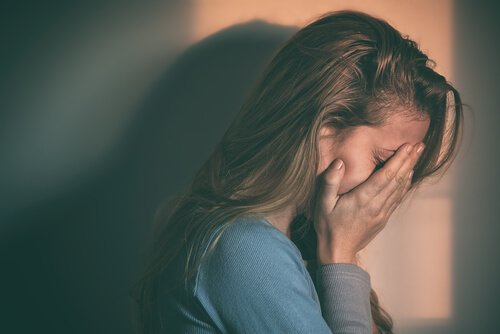The 3 Leading Causes of Depression

Depression is a well-known illness, with a large number of people suffering from it daily. This disease causes serious problems in one’s daily life. Pessimism, lack of will to live and mood shifts are some of its main characteristics. Find out what the main causes behind depression are in this article.
Never confuse sadness with depression: one is temporary, while the other lasts a long time. But, why do so many people suffer from it? Is it genetic? Is it a matter of feelings or emotional sensitivity?
Let’s look at the three leading causes that might help determine if you have suffered from depression.
You might also like: Feeling Discouraged is Normal, But Being Pessimistic Isn’t
The leading causes of depression
1. Genes
Genes carry a lot of weight when we talk about diseases like Alzheimer’s or cancer, but depression deserves a space as well.
It seems that there is a genetic predisposition for these diseases that have affected our relatives, such as depression.
If someone in your close or distant family has suffered this disease, there is a 30% possibility that you will also suffer from it at some point in your life.

Normally, the closer the depressed relative, the higher the probability of suffering from depression.
However, this doesn’t mean we have to suffer this disease. It only means that we are more vulnerable than someone who doesn’t have anyone in their family with depressive traits.
Read Also: Is Cancer Hereditary? What You Need To Know
2. Physiology is everything
Contrary to psychologists, psychiatrists focus much more on pharmacological solutions for mental disorders because there are often physiological factors that provoke them.
In the case of depression, serotonin is the one to blame. It is a neurotransmitter that may cause depression when it doesn’t function correctly. Serotonin not only has to do with depression but rather anxiety as well, which is closely related.

Clearly, depression doesn’t always have a physiological component, and medicine isn’t always the answer. Yet, if you are struggling with depression, ruling out physiological causes is essential.
3. Personal problems
Besides there being possible physiological causes, situations like divorce or sexual abuse can lead to depression. Contrary to the previous reasons, the truth is that depression can be caused by a variety of personal problems.
For example, many women suffer the well-known postpartum depression. This condition takes place after having a baby, and hormones play a key role. Although this disorder may appear at any age, it’s most common in teenage girls or women aged 35-45.

Depression and relationships
Although you may have a genetic predisposition, the main causal factor behind your depression is the quality of your relationships. How you relate to those close to you has a great impact on your emotional health. Ask yourself, how do I relate to my friends and family? Do these bonds make me happy?
If you find yourself in a toxic relationship or you aren’t able to take control of your life, or if you have been surprised by a negative event that you don’t know how to deal with, then you may plunge into a depressive state.
The good news is that there’s a way out of this disorder. Even though it’s a long and hard process that might involve medication, you can get out of it. To put it one way, depression is fought on many fronts. Therefore, in order to eliminate it completely (or control it), one must look at all sides of the equation.

Due to the rapid pace of our lives, there are many things that happen to us, and people of all ages are now struggling with this illness. Also, things like social media can make this problem even worse.
The first step is to find the source of the problem. After that, we can proceed to treat it right away in an efficient manner.
Depression has several causes, but there are also solutions and many resources available. If you think you might be suffering from depression, reach out to someone you trust. Also, try to contact a psychologist that can help you with it. Remember you are not alone and that asking for help makes you strong and brave.
All cited sources were thoroughly reviewed by our team to ensure their quality, reliability, currency, and validity. The bibliography of this article was considered reliable and of academic or scientific accuracy.
- Beck, A. T., & Alford, B. A. (2009). Depression: Causes and Treatment. Journal of Chemical Information and Modeling. https://doi.org/10.1017/CBO9781107415324.004
- Fu, C. M., & Parahoo, K. (2009). Causes of depression: Perceptions among people recovering from depression. Journal of Advanced Nursing. https://doi.org/10.1111/j.1365-2648.2008.04845.x
- Walsh, L. (2012). Causes of Depression. Depression Care across the Lifespan. https://doi.org/10.2307/1172700
- NIMH » La depresión en la adolescencia. (2018). Retrieved 29 July 2020, from https://www.nimh.nih.gov/health/publications/espanol/la-depresion-en-la-adolescencia/index.shtml
-
Zhiqiang, S., Yela, J., & Yuchao, W. (2006). Therapeutic Changes of Brain Brain Neurotransmiters in Depression. Qinghai Medical Journal, (8), 4.
-
Sullivan, P. F., Neale, M. C., & Kendler, K. S. (2000). Genetic epidemiology of major depression: review and meta-analysis. American Journal of Psychiatry, 157(10), 1552-1562.
This text is provided for informational purposes only and does not replace consultation with a professional. If in doubt, consult your specialist.








